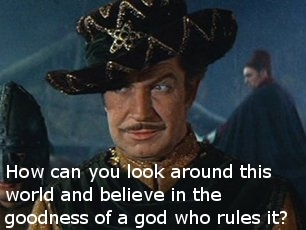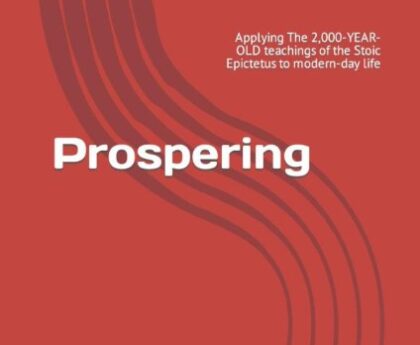 |
| Prince Prospero from the horror film “The Masque of the Red Death” hints at the problem of evil. |
Christian apologist and popular debater William Lane Craig doesn’t think that the problem of evil — a classic philosophical argument which seeks to undermine belief in the Christian god in light of natural disasters and suffering in the world — is a problem. Craig has recently given a lecture concerning the problem of suffering and evil at Aalborg University in Denmark. I’ve watched it and have noticed that his responses to the problem of evil really haven’t seemed to change since his debate with philosopher Kai Nielsen in February of 1991. This post will respond to a portion of Craig’s opening statement from his 1991 debate and attempt to show why his response to the problem of evil is insufficient.
The problem of evil — at a very basic understanding — is well-informed by the above picture. The atheist who points to suffering in the world — particularly natural disasters and diseases which kill people outright and lead to tremendous suffering — sees evidence to assume that an all-loving, all-powerful, and all-knowing god (omni-god) does not exist. If an omni-god existed, some reason, it would not have created the universe in such a manner that guarantees natural disasters and diseases kill people and lead to a great deal of suffering. It is not only the case that God permits the disasters, but it is also the case — as should be noted — that God, if he exists, designed the universe which contains the disasters.
It also isn’t just some suffering that exists, but also an egregious amount of unnecessary suffering. Throughout this post, I’ll use the term ‘natural disasters’ to abbreviate – but it is important to note that much suffering exists because of other factors such as degenerative diseases, mental illness, birth defects, random mutations of genes, and so on. None of what could be considered natural suffering, at least in this case, is the result of human action (and the atheist isn’t arguing for God, for example, to intervene in the case of my stubbing a toe or even my driving a car into a tree following a drunken binge).
An argument, then, along the lines of the problem of evil can be formed as follows:
(1) Egregious natural suffering, guaranteed by the natural laws of the universe, exists.
(2) An all-powerful, all-loving, all-knowing god is incompatible with (1).
(3) An all-powerful, all-loving, all-knowing god does not exist.
Premise one is quite obvious and needs no defense – Christians, even, do not deny premise one, but rather would object to premise two. The atheist can say that God could simply create a universe (and would do so) that is very much unlike ours – one in which an egregious amount of natural suffering does not exist. Why, one wonders, would a god that is all-loving, all-powerful, and all-knowing create this universe? Absent of reasons — and with the seeming contradiction — it seems to be the case that an all-powerful, all-loving, and all-knowing god does not exist. I could further elaborate on justification for premise two, but that shouldn’t be needed here.
William Lane Craig, though, as you might expect, objects to premise two. He says, in his 1991 debate,
…we can actually prove that God and evil are logically compatible. You see, the atheist presupposes that God cannot have morally sufficient reasons for permitting the evil in the world. But this assumption is not necessarily true. So long as it is even possible that God has morally sufficient reasons for permitting evil, it follows that God and evil are logically consistent.
What, then, one wonders, could be these morally sufficient reasons that God might have which would show that God and evil are logically consistent? Craig doesn’t offer any of these reasons, but rather says,
We are not in a good position to assess the probability of whether God has a morally sufficient reason for the evils that occur: As finite persons, we’re limited in space, time, intelligence, and insight, but the omniscient and sovereign God, who sees the end from the beginning, providentially orders history so that His purposes are ultimately achieved through human free decisions. In order to achieve His ends, God may have to put up with evils along the way, which humans freely perpetrate. Evils which appear pointless to us within our limited framework may be seen to be justly permitted within God’s wider framework. A brutal murder of an innocent man, for example, could produce a sort of ripple effect throughout history such that God’s morally sufficient reason for permitting it might not emerge until centuries later or perhaps in another land. When you think of God’s providence over the whole of history, then I think you can see how hopeless it is for limited observers to speculate on the probability that God could have a morally sufficient reason for permitting a particular evil. We’re just not in a good position to assess such probabilities.
Note that above, Craig seems to focus on evils which “human freely perpetrate.” This, though, is not the thrust (or even the argument) of the problem of evil as far as natural suffering is concerned. What we are dealing with here, or otherwise what seems to be contained in the most forceful argument, is natural suffering.
I have always found Craig’s response — paraphrased to ‘we’re not in a good position to judge whether God has a sufficient reason for evils that occur’ — to be quite interesting as it seems to be, despite what Craig says (in his above linked lecture), an ‘appeal to mystery.’ ‘For all we know,’ Craig seems to assert, ‘God might just have a reason.’ Absent of finding any sort of reason, seeing the evidence of an egregious amount of natural suffering in this world (and knowing that if the Christian god existed, he could create a world much different than ours), we have all reasons not to believe in the Christian god, it seems.
We understand that, as humans, our knowledge is quite limited. This, though, when dealing with objections to certain beliefs — in the face of defeaters (reasons to undermine belief) to the beliefs — shouldn’t lead us to simply throw our hands in the air saying something to the effect of, “Well, for all we know…” Knowledge, as it overwhelmingly seems, is based on what we currently know based on observations and reasoning. We hold beliefs, or should hold beliefs, not on what might be, but rather based on what is and what we do know. Absent of reasons that the Christian god might have for designing and permitting an egregious amount of natural suffering, we should be led to the conclusion that the Christian god does not exist – ‘natural evil’ seems to serve as a defeater to Christian belief.
Craig’s position — and the position of every Christian who maintains that God may, ‘for all we know,’ have a good reason to design and permit natural suffering — seems to lead one to the position of, which seems quite interesting in the face of Christians asserting that God is a benevolent being, ‘moral agnosticism’ or even moral nihilism. If, for all we know, God might have a reason to design and permit natural suffering, natural suffering, after all, might be a wonderful thing. On a Christian accounting, God is an all-loving being…so if God designed an earthquake which had killed hundreds of people, this must be a good thing.
Almost all adults (and children) in the world — perhaps barring psychopaths — agree that natural disasters are a terrible, horrible thing. The world would be so much of a better place, it so uncontroversially seems, without natural disasters. This intuition is quite strong and is reflected when persons grieve, donate money to relief efforts, and even try to deter natural disasters. To look at, for example, a tsunami that kills thousands and say, “Well, for all we know this could be a good thing. It might just have been the case that all of those people, for whatever reason, would have been responsible for great moral evils. God might have indeed permitted this, that makes sense” seems to be quite unreasonable – especially when considering the Christian god could achieve whatever ‘ends’ he desires by different means not including designing the universe with natural disasters.
Is the real concern, though, whether we are in the position to judge that God has no good reasons for permitting and designing natural suffering or, rather, is it the concern that the mere existence of egregious natural suffering poses as a defeater to Christian belief? I think it is the latter and that this whole ‘are we in a position’ talk is a distraction from the real issue at hand. Either way, it seems to be the case, with the omni-terms that Christians affix to the god they believe in, that we are in a position to judge that God has no reasons for permitting and designing natural suffering – especially in the case of him being able to design a different universe.
As Prince Prospero said in “The Masque of the Red Death,” if a god of live ever did exist, he is long since dead (although someone, some thing doesn’t seem to rule in its place).
